Week ending 1 August 2020
REGIONAL OVERVIEW
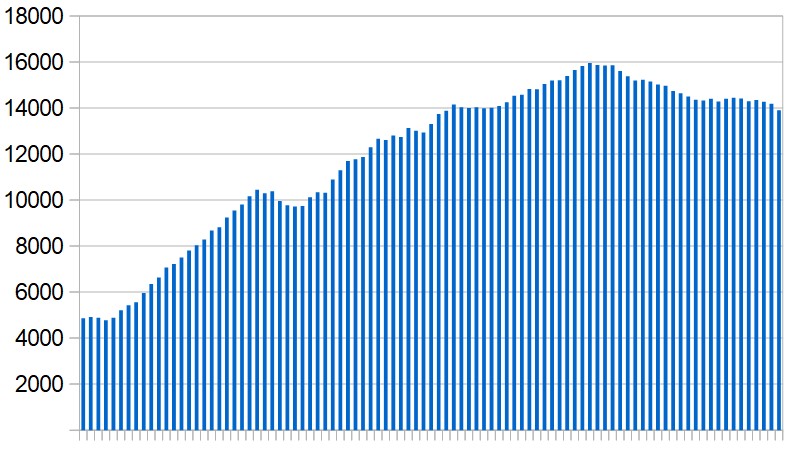 |
More than 97,000 new cases of Covid-19 have been recorded in the Middle East and North Africa during the past week, though many others are not recorded in the official figures.
Among the 20 countries monitored, Iran and Iraq are the worst affected – still reporting well over 2,000 new infections every day. Saudi Arabia and Israel averaged more than 1,500 a day during the past week.
Saudi Arabia's epidemic appears to be subsiding, however, while Bahrain, Egypt, Oman and Qatar have also reported substantial falls in new cases.
Across the region, a further 2,500 coronavirus-related deaths have been recorded during the past week. Iran continues to report around 200 deaths a day, though in other countries the official figures are much lower.
The Hajj – the annual Muslim pilgrimage to Mecca – took place this week in Saudi Arabia under severely restricted conditions. Various countries in the region also imposed extra precautions for Eid al-Adha, the four-day Muslim festival at the end of the Hajj when social and religious gatherings increase the risk of spreading infection.
Official figures from some countries may be abnormally low during the next few days due to delayed reporting of new cases during the Eid festivities.
Detailed statistics for the region, based on official figures, can be found in this spreadsheet.
Previous situation reports: July 25; July 18; July 11; July 4; June 27; June 20.
ALGERIA
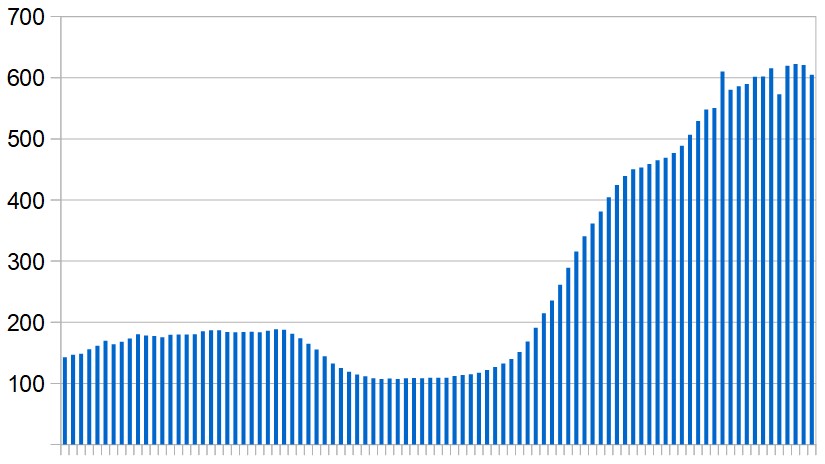 |
New infections in Algeria have increased substantially since mid-June, though the rate of increase has slowed recently. New cases averaged 605 a day during the past week, according to the official figures.
On Thursday the EU removed Algeria from its list of "safe" countries whose residents can travel to Europe without restrictions.
A night curfew (8pm to 5am) has been extended until August 12 in 29 wilayas (administrative districts) including the capital, Algiers. Road traffic in and out of these districts is also restricted. The travel restrictions are reported to be affecting farmers who had been counting on selling their sheep for consumption during the festival of Eid al-Adha.
About 2,300 healthcare workers have been infected with Covid-19 and 44 of them have died, according to the health minister. Testing capacity in Algeria is low – about 2,500 tests a day.
For more information see: Covid-19 in Algeria
Confirmed cases: 30,394
New cases in past week: 4,235
Active cases: 8,647
Deaths: 1,210
Tests carried out: (unknown)
BAHRAIN
Bahrain has almost 24,000 known cases per million inhabitants. This makes it the world's third most infected country after Qatar and French Guiana. However, Bahrain is also one of the world leaders in Covid-19 testing. So far, 48% of its 1.7 million population have been tested.
New infections have been declining recently. This week new cases averaged 361 a day, compared with 426 in the previous week.
Cafes and restaurants remain closed but on Wednesday the authorities announced plans for a phased reopening in September. The education ministry has also issued a circular to private schools setting out "procedures" for the new academic year.
Migrant workers account for a relatively high proportion of Covid-19 cases in Bahrain (discussion here).
For more information see: Covid-19 in Bahrain
Confirmed cases: 40,982
New cases in past week: 2,524
Active cases: 2,995
Deaths: 147
Tests carried out: 831,000
EGYPT
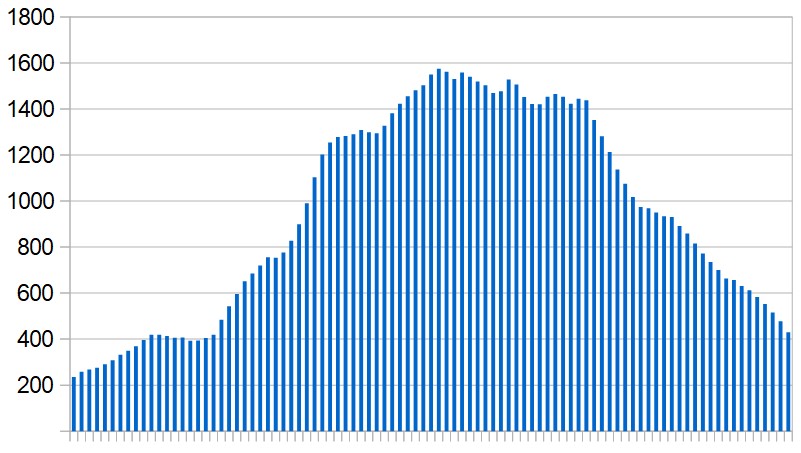 |
New cases peaked in June and have been falling steadily during the past few weeks, according to official figures. This week's average was 429 cases a day compared with almost 1,600 at the peak.
Since June the government has been allowing Prime Speed Medical – a private company with regime connections – to conduct tests for paying customers, according to the Egyptian website Mada Masr. It's unclear how this particular company was chosen and Mada Masr says positive results from its tests are not included in the official figures.
Egypt hopes eventually to become Africa's main production centre for a coronavirus vaccine and is reportedly seeking a partnership deal with a Chinese company.
For more information see: Covid-19 in Egypt
Confirmed cases: 94,078
New cases in past week: 3,006
Active cases: 49,635
Deaths: 4,805
Tests carried out: 135,000
IRAN
Iran was the first country in the region to be seriously affected by the virus and its epidemic shows no sign of abating. On Thursday the total of recorded cases passed the 300,000 mark.
Government figures show an initial wave of infections which peaked at the end of March. It subsided during April, briefly dipping below 1,000 new cases per day but then rose to a new peak in the first week of June. New infections are currently around 2,500 a day.
Iran continues to report more coronavirus-related deaths than any other country in the region. A further 1.377 deaths have been recorded during the past week.
Confirmed cases: 304,204
New cases in past week: 17,681
Active cases: 23,919
Deaths: 16,766
Tests carried out: 2.5 million
IRAQ
Iraq is currently recording more new infections than any other country in the region. New cases this week averaged 2,843 a day. Worse still, Iraq's official figures are widely believed to understate the scale of the epidemic. Many cases go unreported because of social stigma. Compliance with preventive measures appears to be low and health services are inadequate.
For more information see: Covid-19 in Iraq
Confirmed cases: 124,609
New cases in past week: 19,898
Active cases: 32,434
Deaths: 4,741
Tests carried out: 1 million
ISRAEL
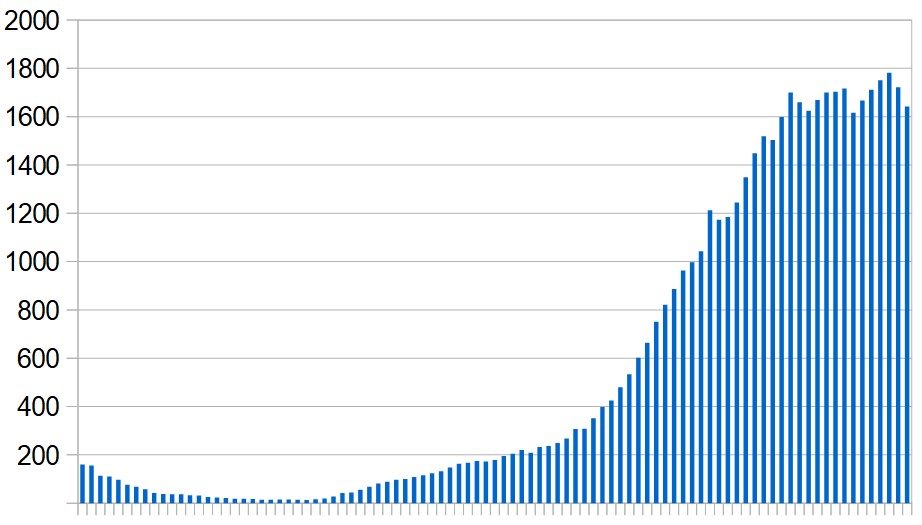 |
After coming close to bringing the epidemic under control, Israel has been hit by a second wave much larger than the first. More than 70,000 people have now tested positive for the Covid-19 virus – most of them during the past four weeks.
The first wave peaked at around 600 new cases a day in early April. Efforts to control it were intially successful and by the second half of May new cases had dropped to about 15 a day. However, the virus surged back when lockdown restrictions were lifted. New cases now appear to have levelled off again, fluctuating between 1,600 and 1,800 a day in the second half of July.
The authorities are trying to avoid a second nationwide lockdown but there has been a lot of argument about the alternatives. On Friday the health ministry said it is establishing a "uniform procedure to determine when and how to restrict gatherings at places of work, cultural events and synagogues". The Jerusalem Post says the plan is to hold "round table" meetings three times a week with the aim of "effectively and coherently" deciding on restrictions.
For more information see: Covid-19 in Israel
Confirmed cases: 70,970
New cases in past week: 11,495
Active cases: 26,608
Deaths: 512
Tests carried out: 1.6 million
JORDAN
Jordan has been one of the most successful Arab countries in controlling the virus. A few new cases are still being recorded but almost all of them are among people who were quarantined after arriving from other countries.
Jordan's continuing night curfew has been temporarily shortened by one hour for the Eid al-Adha holiday and will run from 2am to 6am.
For more information see: Covid-19 in Jordan
Confirmed cases: 1,193
New cases in past week: 47
Active cases: 98
Deaths: 11
Tests carried out: 597,000
KUWAIT
New infections peaked in late May at just over 1,000 cases a day. The numbers have dropped back substantially since then but progress is still slow. New cases during the past week averaged 619 a day – slightly more than in the previous week.
The situation regarding Kuwait's bidoun (stateless residents) and migrant workers during the pandemic is discussed in an interview with Dr Ebtehal al-Khateeb of Kuwait University, published by the Project on Middle East Democracy (POMED).
For more information see: Covid-19 in Kuwait
Confirmed cases: 66,957
New cases in past week: 4,332
Active cases: 8,578
Deaths: 447
Tests carried out: 505,000
LEBANON
In the midst of political and economic chaos, Lebanon began a new lockdown on Thursday. The current lockdown will last five days. Shops and other businesses will then reopen on Tuesday and Wednesday next week before another five-day lockdown starts, ending on August 10.
Although Lebanon's outbreak is still relatively small, new infections have surged during the last three weeks. Earlier this week President Michel Aoun called for “stricter application” of the new lockdowns, complaining about “people’s disregard for the preventive measures.” According to health minister Health Hamad Hassan people arriving in Lebanon have also not been respecting the isolation period.
For more information see: Covid-19 in Lebanon
Confirmed cases: 4,555
New cases in past week: 1,148
Active cases: 2,733
Deaths: 61
Tests carried out: 302,000
LIBYA
Libya is in its ninth year of internal conflict. The UN-backed Government of National Unity in Tripoli is challenged by Field Marshall Haftar's forces based in the east of the country. There are also numerous militias.
This leaves the country ill-equipped to cope with a major epidemic. Growing levels of insecurity, political fragmentation and weak governance have led to a deterioration of basic services, particularly in the health system. At least 27 health facilities have been damaged or closed by fighting and some have been attacked directly. The number of confirmed infections is still small but testing is very limited. There are 870,000 people – refugees, asylum seekers and displaced persons – who the UN regards as especially vulnerable.
The World Health Organisation (WHO) describes the coronavirus situation in Libya as "clusters of cases" – in other words, a series of local outbreaks rather than a generalised epidemic. Sebha, Tripoli, Zliten, Misrata, Ashshatti, Ubari, Traghen, Janzour and Khoms are said to be particular hotspots.
According to the WHO, most Covid-19 cases are centred around Sebha, an oasis city 400 miles south of Tripoli. Sebha is close to the borders with Niger, Chad and Algeria, and is a major hub on the migration route from Africa to Europe. It currently hosts about 40,000 migrants. A Swiss-based organisation, REACH, has issued a detailed report on the situation there.
For more information see: Covid-19 in Libya
Confirmed cases: 3,621
New cases in past week: 720
Active cases: 2,929
Deaths: 74
Tests carried out: 50,000
MOROCCO
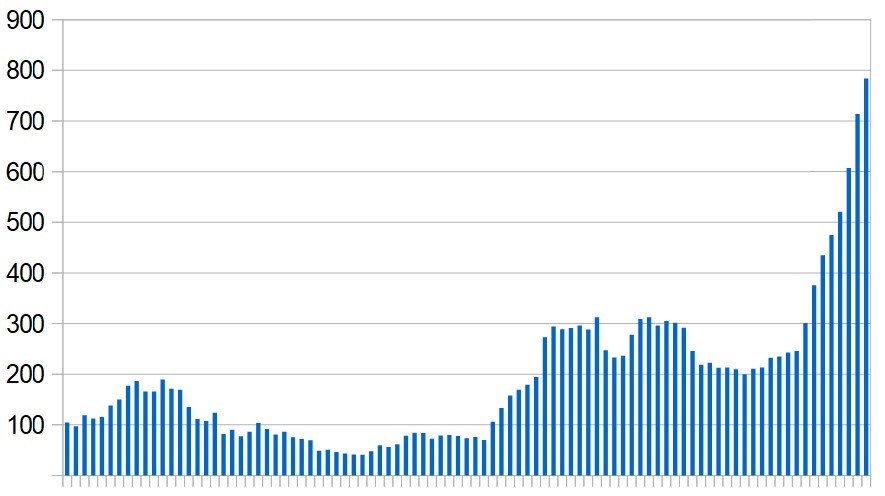 |
Morocco reported 1,063 new Covid-19 infections on Friday – its highest daily total so far. Unlike Algeria, though, it has not been removed from the EU's list of "safe" countries whose residents can travel to Europe without restrictions. The decision to keep it on the list was reportedly due to pressure from France, Belgium, and the Netherlands – countries which have large numbers of citizens of Moroccan descent.
Initially, Morocco seemed to be having some success in containing the virus and by early June, as a result of its strict lockdown, new cases had fallen to around 40 a day. However, there have been steep increases since then, partly due to large numbers of workplace infections.
The public have been asked to limit their movement during the Eid al-Adha holiday. Travel between certain cities has been banned and the government says this is because "the majority of citizens" are not complying with preventive measures. The cities affected are Tangier, Tetouan, Fez, Meknes, Casablanca, Berrechid, Settat and Marrakesh.
The ministry of Islamic affairs also announced that the customary Eid al-Adha prayers would not be allowed to take place in mosques this year and urged people to pray at home instead.
As in Algeria, Moroccan farmers are complaining that restrictions on movement have disrupted their sales of sheep for consumption during Eid festivities.
For more information see: Covid-19 in Morocco
Confirmed cases: 24,322
New cases in past week: 5,488
Active cases: 6,311
Deaths: 353
Tests carried out: 1.25 million
OMAN
New infections peaked in mid-July with just under 1,600 cases a day but are now on a downward path. By Friday the seven-day average had dropped to 930 a day.
The health ministry says it will not issue any further figures until August 5 (presumably because of the Eid al-Adha holiday).
Oman currently has a curfew from 7pm to 6am when movement on foot or in vehicles is forbidden. Public spaces and shops are also closed during the curfew and all gatherings are banned – including those related Eid al-Adha. Police say violators will be fined 100 riyals ($260).
More than 600 medical staff in Oman have been infected with Covid-19 since the outbreak began, according to the government.
For more information see: Covid-19 in Oman
Confirmed cases: 79,159
New cases in past week: 5,368
Active cases: 17,317
Deaths: 421
Tests carried out: 290,000
PALESTINE
Palestine, like Israel, is in the midst of a wave of new infections. More than 15,000 cases have been recorded since the outbreak began – 84% of them during the past month. Hebron is the most seriously affected area, accounting for more than half of all confirmed cases.
Many of the recent infections are attributed to people ignoring the rules for social distancing, which the authorities have difficulty enforcing. The health ministry says more than 30% of cases are the result of Palestinians travelling to and from work in Israel which is in the second wave of its epidemic.
An article on the Mondoweiss website gives an account of this week's Eid al-Adha festivities in the West Bank of Palestine in the midst of coronavirus restrictions.
Fears of a major outbreak in Gaza have not materialised. Most of the known cases there appear to have been due to contacts with Egypt.
For more information see: Covid-19 in Palestine
Confirmed cases: 15,232 (West Bank 10,560, Gaza 75, East Jerusalem 4,597)
New cases in past week: 2,805
Active cases: 8,796
Deaths: 85
Tests carried out: 155,000
QATAR
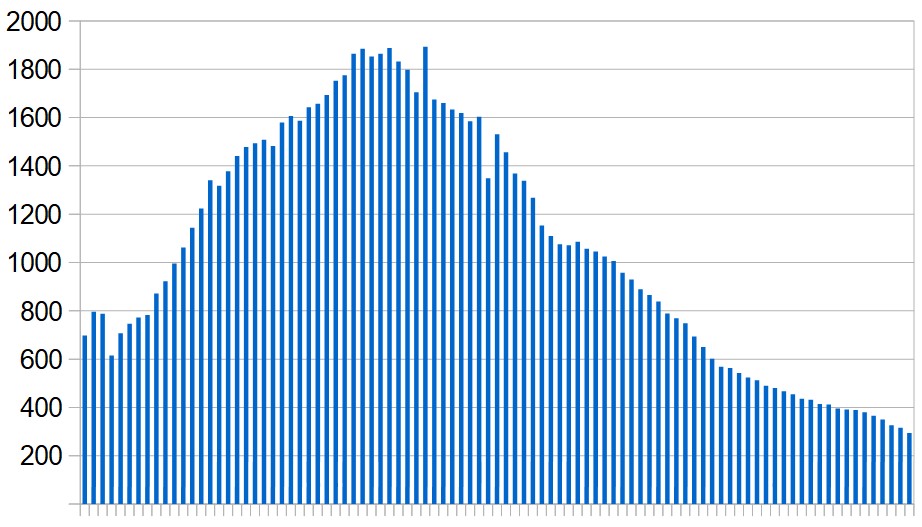 |
In population terms Qatar has more known cases than any other country – 39,000 per million inhabitants. Migrant workers have been disproportionately affected. Qatar's epidemic reached a peak in the first week of June and new infections have fallen steadily since then. During the past week new cases averaged 294 a day, compared with more than 1,800 a day at the peak.
Qatar is due to begin reopening its borders today. Travellers from countries on its low-risk list will need to take a test at the airport and self-isolate for a week before taking a second test. Full details here.
About 200 of Qatar's mosques reopened for Friday prayers this week under Phase 3 of the national plan for lifting coronavirus restrictions.
For more information see: Covid-19 in Qatar
Confirmed cases: 110,695
New cases in past week: 2,027
Active cases: 3,144
Deaths: 174
Tests carried out: 464,000
SAUDI ARABIA
Saudi Arabia has the largest number of recorded cases among the Arab countries. New infections reached an initial peak in the fourth week of May, then dropped back slightly before rising to a higher peak in the third week of June. Since then, though, there has been a substantial improvement. Newly-recorded cases have dropped steadily during the last three weeks and are now around 1,900 a day – about 2,500 below the June peak.
Migrant workers have been disproportionately affected but the authorities have also complained about non-compliance with precautionary measures by Saudi citizens.
The Hajj (the annual pilgrimage to Mecca) took place this week under extraordinary conditions. Normally it attracts more than two million Muslims from around the world but this year it was restricted to about 1,000 participants who had to be quarantined both before and after the event.
Although participation was limited to people already living in the kingdom the Saudi authorities still wanted it to be seen as an international event and said 70% of places would be allocated to the country's non-Saudi residents. These reportedly included number of healthcare workers, in recognition for their efforts during the epidemic.
For more information see: Covid-19 in Saudi Arabia
Confirmed cases: 275,905
New cases in past week: 13,133
Active cases: 37,381
Deaths: 2,866
Tests carried out: 2.9 million
SUDAN
The coronavirus struck Sudan in the midst of a political transition following a popular uprising against the regime of President Bashir and the country is ill-equipped to cope with a major epidemic. Testing is very limited and official figures don't reflect the full scale of the outbreak.
In a grim report earlier this month, the UN's Office for the Coordination of Humanitarian Affairs (OCHA) said transmission of the virus continues to increase and all of Sudan's 18 states are affected, with Khartoum, El Gezira, and Gedaref states among the hardest-hit.
The report continued: "Although Khartoum state accounts for about 70% of all reported cases in the country, over 60% of all Covid-19-related deaths have been reported from outside the capital. Some states have extremely high case fatality rates if compared with global trends, including North Darfur (30% of people with Covid-19 died), Central Darfur (33%), Red Sea (nearly 20%), El Gezira (15%). This could imply that a number of infections are not being diagnosed."
The OCHA has previously reported on the deterioration in Sudan’s health care system which was already "under extreme stress" before the arrival of Covid-19. It said 81% of the population have no access to a functional health centre within two hours' walk from their home. Some existing facilities have been closed due to virus outbreaks or lack of medical staff.
For more information see: Covid-19 in Sudan
Confirmed cases: 11,644
New cases in past week: 342
Active cases: 4,779
Deaths: 746
Tests carried out: (unknown)
SYRIA
According to the official figures, Syria's outbreak is still small but growing steadily. Although only 757 cases have so far been recorded, half of them were during the past three weeks. Official announcements rarely give any details and this lack of transparency fuels suspicions that many cases are being concealed. There is also some evidence that people with Covid-19 symptoms are reluctant to contact the authorities.
Fears have been raised about north-western and north-eastern parts of the country which are outside the regime's control. Millions of displaced people are living in those areas and health services are often rudimentary. Seven new cases were reportedly confirmed by testing in the north-west earlier this week, bringing the total there to 29. The first of these was a doctor working at a hospital in Idlib province who had a large number of contacts before testing positive. An article for Al-Monitor describes medical conditions in Idlib province.
Six cases were previously confirmed in north-east Syria. One died and the others have since recovered.
For more information see: Covid-19 in Syria
The following figures relate to regime-controlled areas only:
Confirmed cases: 608
New cases in past week: 112
Active cases: 477
Deaths: 43
Tests carried out: (unknown)
TUNISIA
At present there is little transmission of the virus inside Tunisia. New cases during the past week averaged 16 a day.
Tunisia has been trying to encourage tourists to return but on Thursday it removed Spain from its "green" list. This means travellers from Spain can no longer enter the country without undergoing quarantine.
For more information see: Covid-19 in Tunisia
Confirmed cases: 1,535
New cases in past week: 110
Active cases: 290
Deaths: 50
Tests carried out: 96,000
UNITED ARAB EMIRATES
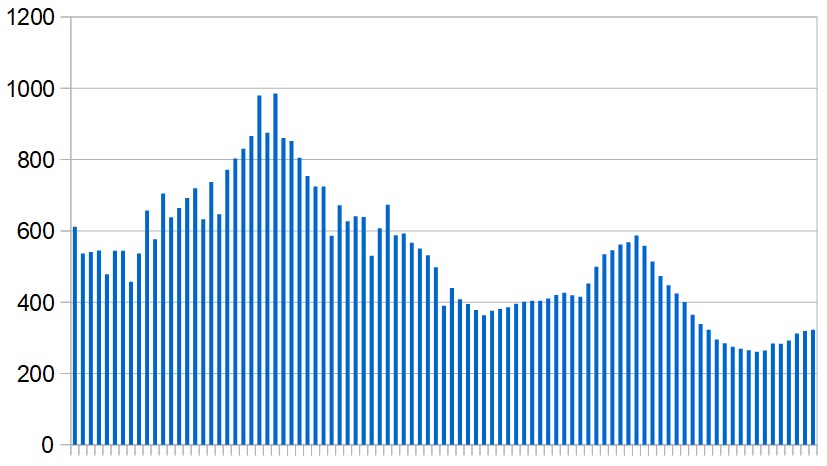 |
The UAE's epidemic peaked in the last week of May when new infections were running at more than 900 a day. The numbers have subsided since then but it has not been a steady downward path. New cases over the past week have averaged 322 a day compared with 261 a day during the previous week.
The UAE has carried out more tests per head of population than any other Arab country and ranks sixth worldwide in terms of levels of testing.
For more information see: Covid-19 in the UAE
Confirmed cases: 60,506
New cases in past week: 2,257
Active cases: 6,246
Deaths: 351
Tests carried out: 5 million
YEMEN
Because of the ongoing war, Yemen already faced a humanitarian crisis before the coronavirus arrived. Millions are malnourished and vulnerable to disease, and health services are inadequate. Official figures grossly understate the severity of the epidemic.
Thousands of people in Yemen may also be dying from undetected cases of cholera because Covid-19 has overwhelmed the country's health facilities and people are too frightened to seek treatment for fear of the virus, Oxfam warned this week. In a report issued on Tuesday the aid organisation said:
"The number of coronavirus cases in Yemen is likely to peak in the coming weeks while the heaviest rains are expected in August which could deepen a hidden cholera crisis.
"The numbers of recorded suspected cholera cases since March have shown an abnormal decrease. In the first three months of 2020, there were more than 100,000 suspected cases of cholera in Yemen but this dropped by 50% in the second three months. Last year, the numbers increased by 70% in the second quarter because it coincides with the start of rainy season.
"It means it’s likely there are already tens of thousands of people suffering with undetected and untreated cases of cholera. According to the WHO, half of those diagnosed with cholera will die from the disease if its left untreated but with timely and adequate treatment, that will remain below 1%."
Besides spreading cholera, flooding during Yemen's rainy season also brings death and destruction. Al-Jazeera reports that since last week at least 14 people have died and more than 35 houses have been swept away in flash floods.
For more information see: Covid-19 in Yemen
Confirmed cases: 1,732
New cases in past week: 54
Active cases: 373
Deaths: 494
Tests carried out: (unknown)

 RSS Feed
RSS Feed
